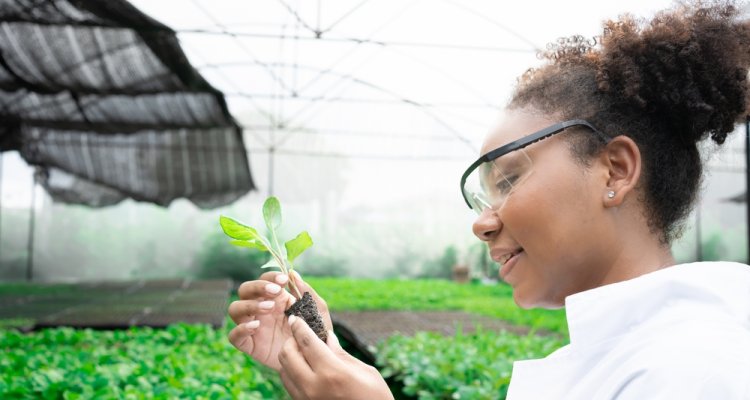
Online
Plant Breeding: Breeding for Quality
Working professionals in the plant breeding sector can enhance their skills and stay ahead of the curve by joining the 'Breeding for Quality' course. This Online Master's course focuses on the latest advancements in breeding for consumer-driven quality traits, such as flavour, colour, and nutritional value, as well as plant compounds for bio-based applications. By gaining knowledge on the metabolic routes of desired compounds and efficient production techniques, you will be equipped to increase yield and enrich mixtures in target compounds. With a deep understanding of breeding objectives and techniques, professionals will be able to meet the evolving demands of the agriculture industry and stay competitive in an ever-changing market.
Registration deadline: 6 November 2025
Please note that the dates for the academic year of 2025-2026 are yet to be confirmed, so they might still change.
Target audience
If you are a working professional in the plant breeding sector, this course is the perfect opportunity for you to expand your knowledge and sharpen your skills. This comprehensive course will provide you with the tools you need to succeed and advance in your career, especially in combination with other advanced Online Master's Courses Plant Breeding.
Prerequisite knowledge
You need to have sufficient knowledge on concepts and methodologies related to plant biology, such as genetics, plant breeding, plant physiology and molecular biology. It's important to realise that, if you do not comply with these recommendations, you cannot claim extra support from the instructor and cannot claim a refund of the registration fee, if you decide to discontinue the course.
Learning outcomes
After successful completion of this programme, you will be able to:
- Define appropriate selection strategies for specific target traits.
- Use this knowledge to develop breeding strategies for improved resistance, tolerance and quality.
- Explain the major characteristics of various quality traits.
- Apply relevant analytic and statistical screening techniques for trait valuation.
Programme
Traditionally, producer traits such as yield and disease resistance have been the primary breeding targets in many crops. In current agriculture, however, consumer-driven quality traits, such as flavour, colour and nutritional value have become increasingly important, and the same holds for the production of specific plant compounds which can be used as sources for bio-based applications. Breeding for Quality is directed at improving whole fruit/vegetable characteristics and plant compounds, where flavour, colour, texture, absence of antinutritional factors or allergens, and shelf-life are important breeding objectives.
Breeding for Quality also comprises the efficient production of all kinds of compounds, which are used as ingredients by the food, pharmaceutical, chemical, textile, paper, etc. industries. Examples of such compounds are carbohydrates (starch, fructans, cellulose), proteins (wheat gluten, pea storage proteins), vegetable fats/oils (rape seed oil, cocoa fat), and secondary metabolites like flavours, fragrances, and phytoestrogenic molecules. In breeding programmes, the existing genetic variation is exploited to increase the yield of (or enrich mixtures in) the target compounds. To bring this about, it is necessary to understand the metabolic routes leading to the synthesis of the desired compound, and to have knowledge on how these compounds can be determined in the plant material.
This course is an online course at master level that you follow in a cohort. Learners participate at different time points and from different time zones, as most learners also have a job. The programme therefor offers learning activities that allow you to supervised self-study at your own pace, with deadlines for assignments, and includes knowledge clips, e-learning modules, read literature, online individual and group exercises and assignments and online discussions. Links to relevant articles will be provided through the online learning environment (included in course fee). In some courses occasionally live question hours through MS Teams at specific dates and times. There are no online live classes. The exam has a fixed date.
This course is quite time-intensive and requires approximately 20 hours per week for the average participant. There are assignments with deadlines.
This course fits logically upfront the online Master's Course Markers in Quantitative Genetics and Breeding
Examination
Participation in the remotely proctored exam is optional. If you decide not to participate in the exam, you do not qualify for a certificate and/or Micro-credentials.
The date of examination is 18 December 2025. The duration of the exam is 3 hours. A resit will be scheduled on 7 May 2026.
Certification
Upon successful completion -- passing the exam and making assignments- , a digital certificate with 2 study credits (ECTS) is issued. This certificate gives no immediate rights to apply towards a formal degree programme at a university; but might support your request to admission.
Coordinated by
Registration
Join this course now.
For 15 years, our research focussed on unravelling the genetics of consumer quality traits in tomato. The unparalleled insights this has yielded can now serve as a blueprint for the study of quality traits in other fruits and vegetables.